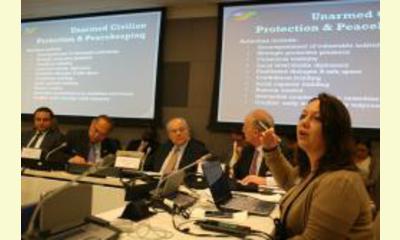|
|
Nonviolent Peaceforce Featured at High Level Briefing at the UN
an article by Nonviolent Peace Force
Over 130 representatives of UN member States, Observers, UN officials and civil society representatives met Friday at the UN, for a high level briefing organized by the Permanent Missions of Belgium, Benin, Costa Rica and Philippines, to discuss broadening the concept of peacekeeping to include the contribution of civil society to the unarmed protection of civilians in conflict situations. . .

Mr. Tariq Al-Ansari, Deputy Chief of Staff of the President of the General Assembly, Mr. Nassir Abulaziz Al-Nasser, H.E. Ambassador Jean-Francis Zinsou, Permanent Representative of Benin, H.E. Ambassador Eduardo Ulibarri, Permanent Representative of Costa Rica and H.E. Jan Grauls, Permanent Representative of Belgium look on.
click on photo to enlarge
Mr. Tariq Al-Ansari, Deputy Chief of Staff of the President of the General Assembly opened the event with remarks on behalf of the President, Mr. Nassir Abulaziz Al-Nasser: “ We all understand that UN Peacekeeping mandates have become more complex. And the protection of civilians is becoming more and more crucial to the work of our Missions.” He also affirmed: “To protect them, we need to make sure that all available resources are engaged in a combined and well-coordinated effort."
He was followed by Mr. Rafael Seguis, Under-Secretary of the Philippine Department of Foreign Affairs who affirmed the strong contribution well-organized civil society can play in protecting civilians amid violent conflict. Citing the choice by both the government of the Philippines and the Moro Islamic Liberation Front of Nonviolent Peaceforce (NP) as the only international nongovernmental organization to be part of the official agreement on Civilian Protection, Under-Secretary Seguis stated, “Both parties were already aware of Nonviolent Peaceforce’s presence in the very ‘hotspot’ areas of Mindanao…it’s track record on the ground with respect to conflict prevention activities and the good relations it continues to maintain with local stakeholders.”
He pointed out that it was "a unique model of unarmed civilian protection that directly engages civil society groups doing peacekeeping work, and taps into their knowledge, experience and manpower" and that this arrangement has contributed to the peace process.
While the Mindanao peace process is a work in progress, Mr. Seguis observed that the model of incorporating civil society into the process, “Provides options for consideration as we seek to broaden the concept of peacekeeping at the UN.”
Ms. Tiffany Easthom, Country Director of Nonviolent Peaceforce´s peacekeeping project in South Sudan described how NP has 65 unarmed civilian peacekeepers in eight locations throughout South Sudan including areas affected by Joseph Kony and the Lords Resistance Army as well as near the country’s border with The Sudan.
Ms. Easthom explained how unarmed civilian peacekeepers are protecting civilians and supporting local civil society in preventing violence in some of the most violent places in the world. These peacekeepers engage in a variety of strategies and must remain “nimble and adaptable.” She recommended that these, “newly proven practices need to be supported and scaled up . . .Unarmed civilian peacekeeping is an entirely appropriate response to violent conflicts in many more countries in many more situations and needs to be scaled up."
The event allowed for a rich discussion on aspects including the contexts where unarmed civilians can play a role in the protection of civilians, the specific role of women in the protection of civilians by civilians, and the ways by which the UN peacekeeping and protection architectures could make better use of trained civilians for the unarmed protection of civilians.
Next steps to advance policy and funding support for unarmed civilian peacekeeping are now being considered.
|








|
DISCUSSION
Question(s) related to this article:
Can peace be guaranteed through nonviolent means?,
* * * * *
Latest reader comment:
We have the advantage of an independent evaluation of the Nonviolent Peaceforce initiative in the Philippines conducted by Swisspeace. The evaluation is very favorable, although in the end, as one reads through it, gets the impression that such initiatives can help but cannot bring peace by themselves.
Here is the executive summary:
Nonviolent Peaceforce in the Philippines can look back at more than two years of unique, relevant contributions and constructive engagement in one of the most difficult, political and volatile, contexts to work in: Being the only international non-governmental organization working with and living in close proximity to the most conflict-affected population in Mindanao, NP in the Philippines was able to support and enhance local structures of cease-fire monitoring, early warning, cross-community dialogues, human rights protection, to offer civilian protection and help to reduce the high levels of community violence.
The accepted offer to NP in the Philippines in late 2009 by the conflict parties GRP and the MILF to join the International Monitoring Team1 (IMT) and its Civilian Protection Component is a direct expression and result of its successful contributions to non-violence and violence reduction of the last two years.
To keep up the important work of NP’s project in the Philippines in the years to come, it is essential to ensure that the activities and objectives of NPP are based on a strategically and conceptually sound footing. This seems even more important given that NPP is going through a remarkable consolidation and expansion phase at the time of report-writing.
The re-focus on its key mandate, strengths and strategic advantages in Mindanao gives NP the opportunity to further enhance its unique work in the area of nonviolence, peacekeeping and peacebuilding.

|
|









